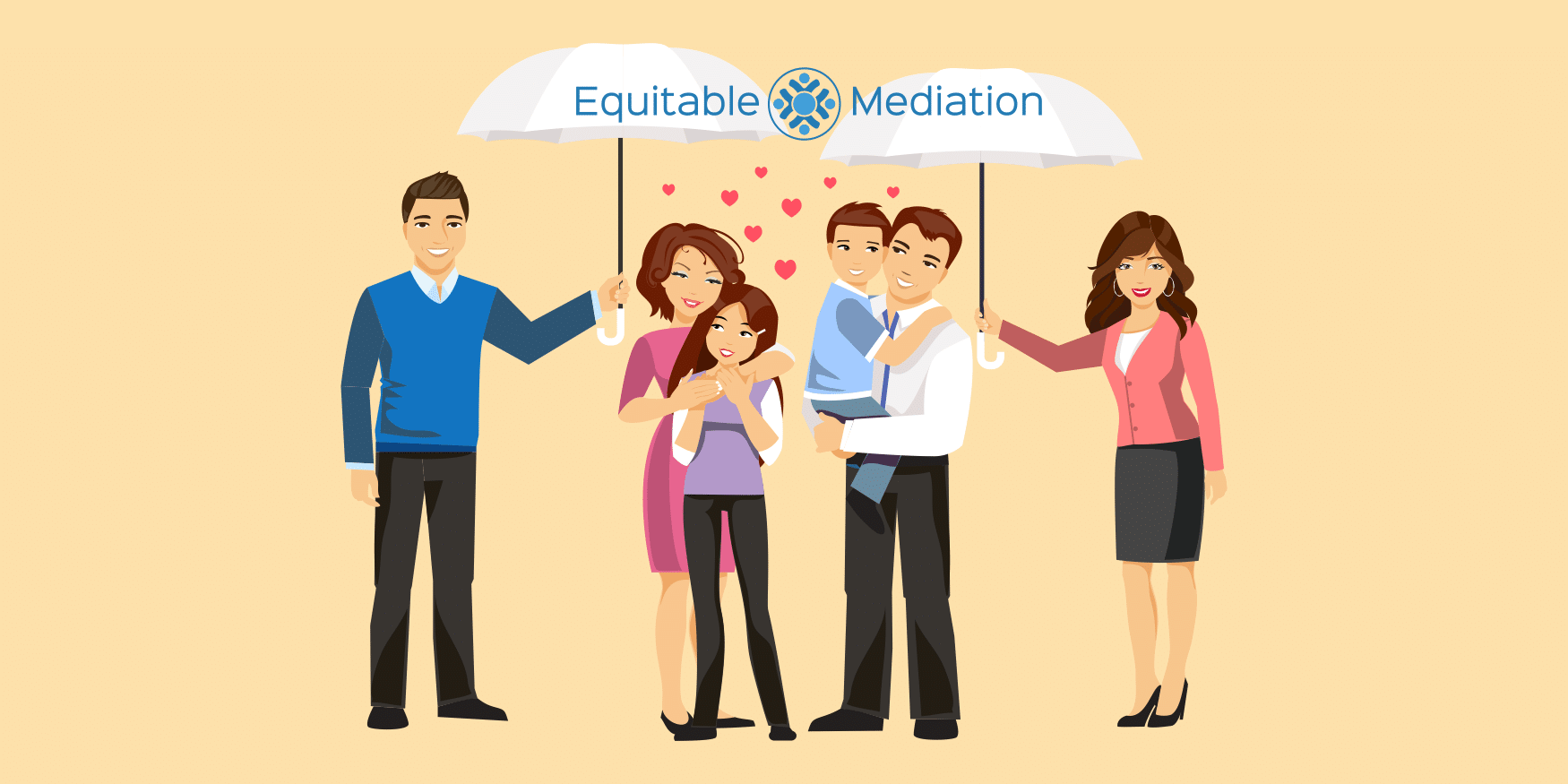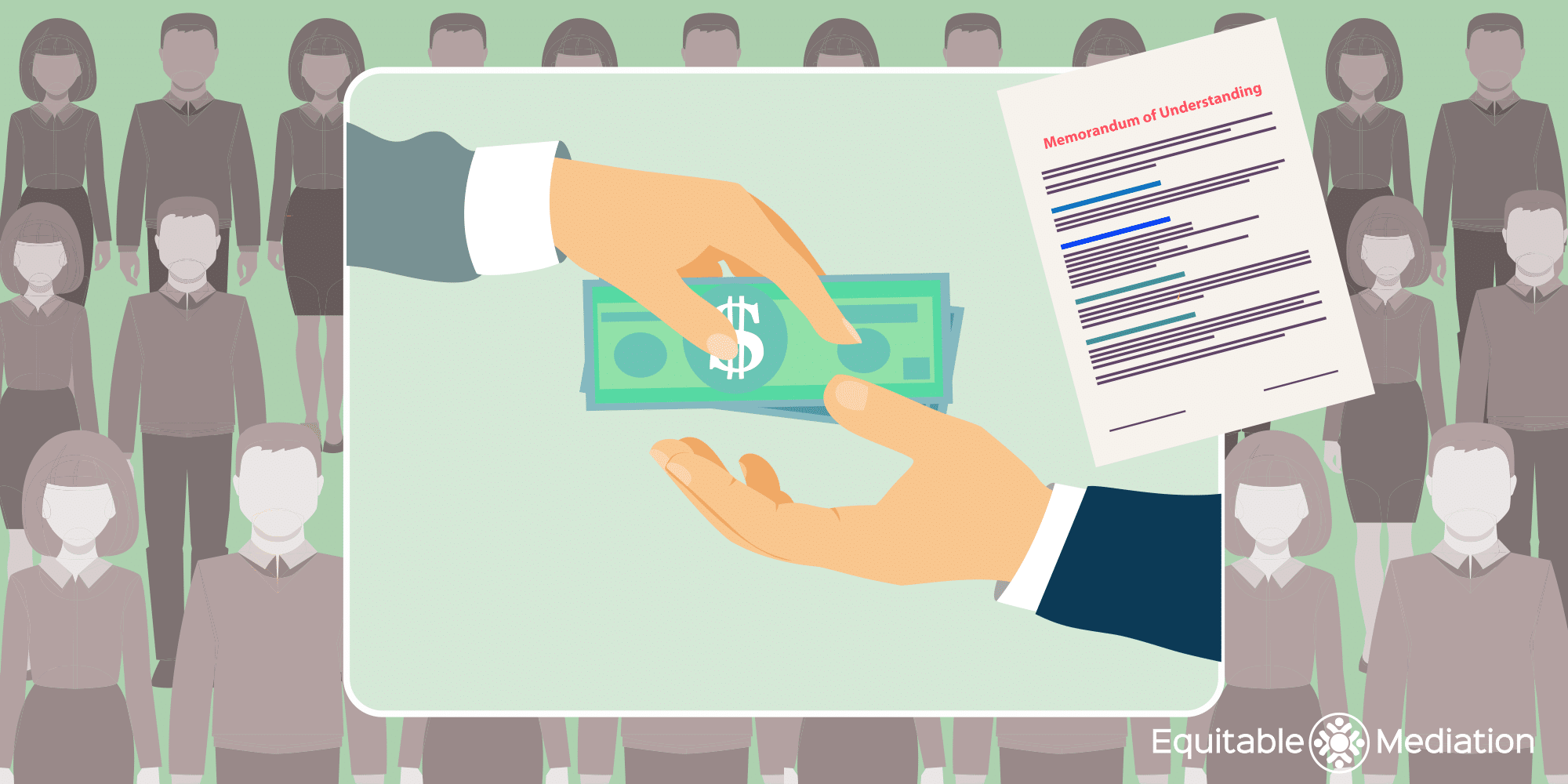- The mediator you hire to guide you through the divorce process is just as important as the decision to use mediation itself.
- Hiring the best and most competent divorce mediation specialists will make all the difference in how peaceful your divorce will be and what it will cost. And how fair, thorough and child-focused your agreement will be.
- In this post, I will share the criteria to use when evaluating the qualifications of a mediator. And how to determine if the person you’re considering is best-qualified and has the expertise to help you.
You want a divorce. And you want to mediate. Which is more than I knew when my ex-spouse and I made the decision to end our marriage. We hadn’t ever heard of mediation. All we knew is we wanted to get an uncontested divorce without lawyers and respectfully resolve our issues out of court. And we didn’t want to go broke in the process.
A friend told me about mediation and I found a divorce mediator near me. And luckily, my mediated divorce case went quite smoothly. My now ex-husband and I completed the process in a few months and our entire divorce cost less than we would have spent on the attorney retainers alone.
But as you probably already know, making the decision to use mediation is only a small part of getting a divorce. You also need to figure out how to find a mediator for divorce who is competent and qualified. Because the mediator you hire to guide you through the divorce process is just as important as the decision to use mediation itself.
So what are the criteria to use when evaluating the qualifications of a mediator? And what do you need to know about how to find a good divorce mediator and determine if the person you’re considering is competent and best qualified to help you and your spouse? Luckily you’ve come to the right place because those questions and more will be answered in this post.
How to find a good divorce mediator:
Other than the decision to divorce itself, there is no single more important decision than choosing a divorce mediator qualified to handle your divorce.
The mediator you choose will play a critical role in:
- How well your divorce goes from both a financial and emotional standpoint;
- How thorough your agreement is;
- How likely you and your spouse will need to return to court in the future;
- How fair and equitable your settlement will be.
So instead of simply asking, “How do I find divorce mediators near me?” – seek out the best mediator to help you.
Because doing so will make all the difference in how peaceful and cost-effective your divorce will be. And how fair, thorough and child-focused it will be.
There are 5 steps for how to find a mediator for divorce:
Step 1: Learn good mediator qualifications and questions to ask a mediator.
Step 2: Identify a few mediators who practice in your state.
Step 3: Do some research and create a short-list of divorce mediators to consider.
Step 4: Schedule an initial meeting with the mediator(s).
Step 5: Choose the divorce mediator best qualified to help you.
Step 1: Learn good mediator qualifications and questions to ask a divorce mediator
The first step in how to find a mediator for divorce is to know the criteria for what makes a mediator good. This way, you’ll know what to look for when choosing your divorce mediator.
Mediation is an unregulated practice area in most states.
That means, anyone (and I mean anyone), can build a website, print out business cards and call themself a divorce mediator. There is no formally recognized national certification for mediators.
Some alternative dispute resolution organizations create their own mediator certification, enabling their members to include titles like, “certified mediator,” “professional mediator,” “accredited professional mediator,” etc. after their name. But there is no consistency from organization-to-organization and these titles alone do not necessarily indicate one mediator is better qualified or more experienced than another.
Things to find out about a mediator regarding their qualifications include:
What training has the divorce mediator had?
A basic training course for divorce mediation is 40 hours. And some mediators don’t have any training at all.
In addition to knowing about the issues surrounding divorce, a mediator also needs to know how to mediate.
Mediation is a skillset unto itself!
Mediation services providers also have many different backgrounds.
Lawyers:
Some divorce attorneys think that attending law school provides them with the skills they need in order to practice mediation. But while divorce lawyers may have a grasp of family law, they may not know how to be an effective mediator.
A divorce attorney dispenses legal advice and is trained to “fight and win.” So they may not know how to resolve conflict or be a truly neutral third party – which is the cornerstone of mediation.
A lawyer also may not have the acumen required to resolve the many complex financial issues surrounding divorce.
Retired judges:
A recent trend is retired court judges marketing themselves as mediators for divorce. And while they have experience ruling in a litigated divorce after listening to the parties pleading their case, that’s the exact opposite of what’s required for mediation.
A competent mediator doesn’t dictate a couple’s divorce terms. Instead, they help the two spouses negotiate so they can create their own mutually-agreeable solutions.
But just like a mediation attorney, a former judge isn’t going to have the necessary skills to resolve the financial matters surrounding divorce.
Social workers / therapists:
A social worker or therapist may have taken a divorce mediation training class to understand basic mediation techniques, and may be equipped to help create a parenting plan or resolve child custody disputes to preserve the family unit.
But a mental health professional does not often possess in-depth knowledge of the other divorce issues or have the financial expertise required to be a competent mediator.
Non-attorney mediators with a financial acumen:
There are also non-attorney mediators with a financial background, like our company founder and expert mediator, Joe Dillon.
The key is to know how to find a family mediator who has been professionally trained, is knowledgeable in all of the issues that need resolution, is truly neutral and is also skilled in resolving the complex financial matters surrounding divorce.
How long has the mediator been practicing?
While all mediators have to start somewhere, make sure the mediator you hire has the experience to handle the complexities of your specific situation.
If you’ve been married only a few years, have no children, joint property, or assets and alimony isn’t applicable, a new or less experienced mediator may be fine.
But if your case is more complex, you’ll need someone more experienced and highly skilled to ensure your divorce settlement agreement is fair, thorough, and will stand the test of time.
Is divorce and family mediation their full-time profession?
You may encounter mediators who also have a primary “day job” such as social worker, accountant, or divorce attorney (litigator). But if the mediator you’re considering only practices mediation as a secondary job and isn’t mediating full-time, it means they probably don’t mediate more than just a few cases each year.
It also may make staying on top of the latest developments in the practice area difficult.
Make sure the mediator you choose practices mediation full-time.
How much experience does the mediator have specifically with divorce cases?
Some mediators handle civil or business disputes. Others handle family disputes and divorce matters. Some divide their time between all types of mediation. Laws, guidelines and approaches to the way state-specific issues are addressed change constantly.
So even if they’re a full-time mediator, make sure they have sufficient experience with the issues of divorce.
What is the mediator’s financial acumen?
Divorce is less about laws and more about money (and parenting, if you have kids). In fact, three of the four areas that need to be resolved in a divorce are directly related to money and finances: child support, property division (referred to as equitable distribution in some states and community property in others) and alimony.
So in addition to helping you create a sound parenting plan, it’s important the mediator you’re working with has a firm grasp on calculating child support and determining alimony / spousal support.
But it’s also critical they’re skilled in analyzing the complexities of investment-based assets, employee stock incentive awards, business valuations, and projected expenses and are also able to value retirement assets, bracket support scenarios, prepare a balance sheet of marital property and debts and make you aware of potential tax issues that may affect your settlement agreement.
What does the mediator do to stay on top of the latest developments in their profession?
The issues surrounding divorce frequently change, so seek a mediator who stays on top of the latest developments and trends and is a respected authority in their profession. Find out about the mediator’s continuing education efforts and involvement in their professional community.
What is the mediator’s case resolution rate?
What is the mediator’s rate of settlement?
A good divorce mediator should be able to successfully resolve at least 90-95% of their cases. And an expert mediator will be able to successfully resolve greater than 95% of their cases.
Does the mediator have a proven mediation process to keep your divorce productive and efficient?
A good divorce mediator has an effective process to help keep your mediation sessions focused and on track. They also leverage technology including secure online file sharing, screen sharing and collaboration tools to keep communications efficient and transparent.
What is the mediator’s style, philosophy and approach to mediation sessions?
A mediator’s style and approach will vary significantly.
Some mediators are facilitative and take more of a back-seat approach, relying on the parties (the two spouses) to direct the proceedings. Some mediators are evaluative and tend to tell the parties what to do without much regard for their input.
Other mediators take a more structured, active approach to the way the mediation is conducted. These mediators are more likely to present options, but empower the parties (the two spouses) to decide.
The style or styles a mediator uses may also depend a great deal on their professional background. For example, judges who become mediators tend to be more evaluative while mental health professionals tend to be more facilitative.
The best mediators are skilled in employing a variety of styles. They know how to apply the right style at the right time in a mediation session based on a couple’s unique interpersonal dynamic.
Step 2: Identify a few professionals who practice divorce mediation in your state
Now that you know the criteria to use when evaluating a divorce mediator, the next step in how to find a good family mediator is to identify a few who practice in your state.
If you’ve been seeing an individual or couples counselor, or you have family or friends who used mediation for their divorce, they may be able to give you the names of some mediators near you. This is a good place to start, especially if you know, trust and value the opinion of the person making the referral or recommendation.
Finding a mediator on the internet is another option.
You can either do a Google search for “divorce mediator near me” or “divorce mediation NJ,” “divorce mediation Chicago,” or whichever state or city you live in. There are also a number of directory websites available that list divorce mediators by city, state or county.
Step 3: Research the divorce mediators and create a short list
Once you’ve found the names of a few mediators who practice in your state, you can click around on their websites to dig deeper and learn more about them. Since no two divorces are the same, you’ll want to find divorce mediators who possess the skills and expertise to help you resolve all of the issues relevant to your situation.
For example, if you and your spouse are divorcing after 20 years of marriage, own a home, are self-employed and/or are divorcing with a business involved, have retirement accounts or lots of debt, you’ll want a mediator with a financial background.
Or, if you and your divorcing spouse are a high conflict divorcing couple and are having a difficult time communicating, you may want a mediator who includes coaching.
See if there is information on their websites that address the criteria outlined in Step 1.
Remember, there’s a big difference between finding just any mediator and choosing a good divorce mediator who is a highly skilled expert.
Your goal is to narrow down the list of prospective mediators to a short list of two or three.
Step 4: Schedule an initial meeting with each mediator
After you’ve compiled a short-list, the next step in how to find a good divorce mediator is to schedule an initial meeting with each of them. Some mediators conduct their initial meetings in-person, some conduct them by telephone and some conduct initial meetings via videoconferencing software such as Zoom or Google Meet.
Some charge a fee for their initial meeting and some do not.
It varies from mediator to mediator.
A good divorce mediator isn’t necessarily the one who has an office closest to your home.
During your initial meeting, seek answers to any remaining open questions about the mediator’s qualifications along with information on the mediator’s services, fees, approach, and case resolution rate.
What is the scope of services provided by the divorce mediator?
Find out what’s included and what’s not included in the divorce mediation service and whether or not the mediator has a proven process to keep things efficient and on-track.
Find out if the mediator will provide you with a comprehensive agreement or if you will need to pay an attorney to draft (or re-draft) your agreements at the end of the mediation process.
Inquire about the mediator’s use of technology and find out if he/she effectively leverages it to make the process as efficient as possible including the ability to mediate online?
Ask if the mediator offers any services like coaching to support you with the emotional aspects of divorce.
If other specialists need to be involved at any point in your divorce such as an accountant, mortgage professional or real estate agent, find out if the mediator has a network of trusted professionals to whom they can refer you.
What are the mediator’s fees?
Divorce mediation fees vary significantly based on the state you live in, the mediation experience and skill level of the mediator, the different services they offer and individual case complexities.
Some mediators require payment after each mediation session and will then charge a separate fee for drafting of the Memorandum of Understanding (MOU) which outlines all of the terms of your settlement agreement. Others require an initial retainer and will then bill you by the hour after that. There are even a few mediators (like us) who offer flat-fee pricing for their services so you’ll know up front what your divorce mediation will cost.
And keep in mind, while seasoned mediators may have higher hourly rates, their expertise often leads to more efficient resolutions, potentially reducing the overall time and cost of your divorce proceedings.
It’s common to want to compare the fees of various family law mediators, but it’s also important to recognize that it may be difficult to compare apples to apples based on the various factors described above.
You will always find someone cheaper, but the bottom line is if you choose your mediator solely on their price, you may wind up sacrificing the quality of your agreement.
And this may cause you to have to spend more money and time at the end of the process or in the future whether it be to re-draft paperwork or correct mistakes or omissions.
Is the mediator compassionate?
The best divorce mediators are fully invested in you and your success. Does the mediator show empathy for the human side of divorce? Do you feel like they are genuinely concerned about your financial and emotional well-being and the well-being of your children?
It’s most important to hire a mediator with the expertise and skills to help you resolve the issues in your divorce, but you also need to feel comfortable working with this person. If you have a good rapport with the mediator during the first meeting, it’s a good sign that you’ll enjoy working with him/her.
Trust your gut.
If for any reason you are uncomfortable with a mediator, you should find another one.
What does the divorce mediator think about involving lawyers?
While there are no laws requiring the involvement of lawyers at any time during a divorce and many couples choose to mediate because they specifically want to avoid using lawyers, a good mediator will not discourage the use of attorneys to review the agreement if either or both spouses wish to involve them.
Note: Some mediators require spouses to hire lawyers during or after mediation, so it’s important to ask a prospective mediator this question before you hire them.
Step 5: Choose and hire the best divorce mediator for your situation
Once you’ve had initial meetings with your short list of prospective mediators, it’s time for the final step in how to find a good divorce mediator – make your final decision and choose your professional.
Think about each initial meeting:
- Did you get an overview of the mediator’s professional background and training?
- Did they clearly explain their divorce mediation process to you?
- Did the mediator get to know a bit about your situation and tell you if you are a good fit for mediation (and them)?
- Did they share with you their case resolution rate?
- Were they upfront about mediation costs and how their fee structure works?
- Did they outline their scope of services so you know exactly what they help/do not help with?
- And most importantly, were they compassionate and did you feel comfortable with them?
All of these things can go a long way towards helping you and your spouse peacefully come to an agreement that is fair to both of you and that puts your children first.
Taking the time to learn how to find a good mediator and then finding one requires time and effort, but it’s worth it!
So there you have it! You now know how to find a family mediator for divorce and:
- That other than the decision to divorce itself, there is no single more important decision than choosing a good mediator to handle your divorce;
- That your success in mediation lies squarely on the experience and competency of your mediator;
- That if you want a high quality mediation that’s peaceful, economical, and results in an agreement that is fair, thorough and in the best interests of your children, it’s crucial you choose your mediator based on their knowledge, experience and ability to help you in your unique situation.
Lucky for you because you’ve just found the best mediator to guide you through your divorce. His name is Joe Dillon and he’s the founder of Equitable Mediation Services.
What makes Joe Dillon an expert mediator?
Joe is a professionally trained and experienced mediator for divorce. And in addition to his formal mediation training and extensive knowledge of each divorce issue, he earned an MBA in finance and is skilled in resolving even the most complex financial matters surrounding divorce.
Joe has been mediating in some capacity for more than 25 years and has the skills and experience to handle even the most complex of situations.
Joe mediates full-time and specializes solely in divorce mediation in order to devote the necessary time and attention required to be the best divorce mediator he can be. He is also a well-respected authority in the mediation community.
In addition to maintaining professional memberships with the Southern California Mediation Association (SCMA), the Academy of Professional Family Mediators, the Washington Mediation Association, the Chicago, Illinois chapter of the Association for Conflict Resolution (ACR), the Pennsylvania Council of Mediators, and the NY State Council on Divorce Mediation, he is a former adjunct instructor for Northwestern University’s and the New Jersey Association for Professional Mediators (NJAPM) 40-hour divorce mediation training courses.
Joe takes an active approach to mediation because he finds that this approach best guides couples to a mutually agreeable settlement in a timely and cost-effective manner and keeps them out of financially ruinous and emotionally devastating litigation. He’s compassionate and genuinely concerned about the well-being of his clients and their children. And it shows in the way he approaches mediation.
For every year Equitable Mediation has been in practice, Joe’s case resolution rate has consistently been greater than 98%. Which means that these clients resolved all of their issues and reached mutually-agreeable settlements – privately in mediation with Joe’s help, instead of in a courtroom.
And so can you!
Choosing a mediator to handle your divorce is a very personal matter. And there are a lot of things to consider when deciding who to hire.
If you want a competent and highly skilled mediator to guide you through your divorce, don’t settle by simply wondering, “Should I find any family mediator near me?” Instead, seek out and choose to work with Joe Dillon and Equitable Mediation.
Working with Equitable Mediation is the best decision you can make if you are going to mediate your divorce.







